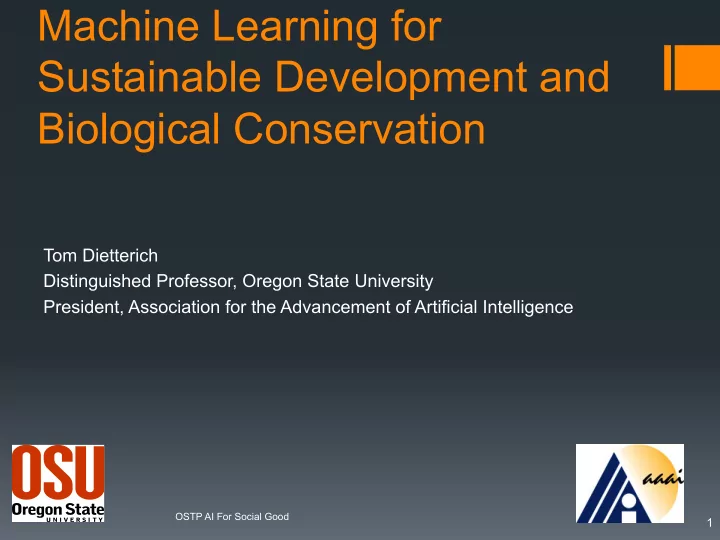

Machine Learning for Sustainable Development and Biological Conservation Tom Dietterich Distinguished Professor, Oregon State University President, Association for the Advancement of Artificial Intelligence OSTP AI For Social Good 1
Computational Sustainability Data Acquisition § The study of computational methods that can contribute Data to the sustainable Interpretation management of the earth’s ecosystems Data Integration Model Fitting Policy Optimization Policy Execution OSTP AI For Social Good 2
Data Acquisition Data Acquisition § Africa is very poorly sensed § Only a few dozen weather stations reliably report data to WMO (blue points in map) § Project TAHMO (tahmo.org) § TU-DELFT & Oregon State University § Deploy 20,000 stations across Africa § Provide data to farmers and to enable crop insurance industry § Increase agricultural productivity § Computational Problem § Where to place the weather stations? § Krause, Singh & Guestrin, 2008 OSTP AI For Social Good 3
Data Interpretation Data § Insect identification for population counting Acquisition § Raw data: image § Interpreted data: Count by species Data Interpretation § Method: Computer Vision § Lytle, et al., 2010 Species Count Limne 3 Taenm 15 Asiop 4 Epeor 25 Camel 19 www.epa.gov Cla 12 Cerat 21 OSTP AI For Social Good 4
Data Integration Data Acquisition § Virtually all ecosystem prediction problems require integrating Data Interpretation heterogeneous data sources § Landsat (30m; monthly) Data § land cover type Integration § MODIS (500m; daily/weekly) § land cover type § Census (every 10 years) § human population density § Interpolated weather data (15 mins) § rain, snow, solar radiation, wind speed & direction, humidity Landsat NDVI: http://ivm.cr.usgs.gov/viewer/ OSTP AI For Social Good 5
Model Fitting with Machine Learning Data Acquisition § Species Distribution Models Data § create a map of the distribution of a Interpretation species Data § Migration and Dispersal Models Integration § model the trajectory and timing of movement Model Fitting OSTP AI For Social Good 6
eBird Project § Volunteer Bird Watchers § Time, place, duration § Species seen § 8,000-12,000 checklists uploaded per day § Computational Method: Collective Graphical Model (Sheldon et al., 2011) OSTP AI For Social Good 7
Fitted Migration Model Ruby-Throated Humming Bird Sheldon, Sun, Liu, Dietterich unpublished OSTP AI For Social Good 8
Policy Optimization Data Acquisition § Compute optimal policies for Data managing ecosystems Interpretation § Incorporate uncertainty about the future Data Integration § Computational Tools § MDPs (Markov Decision Problems) Model Fitting § POMDPs (Partially-Observable MDPs) Policy § Point-based solvers (Pineau, 2003; Optimization Poupart, et al. 2005; Kurniawati et al, 2008) OSTP AI For Social Good 9
Protecting Coastal Habitat to Protect Migrating Birds from Sea Level Rise § East Asia-Australia migratory pathways § Sea Level Rise destroys habitat unless areas further inland have been protected § Timing and location of protection depends on the timing of future sea level rises § POMDP formulation § Nicol, et al. 2015 OSTP AI For Social Good 10
Results: Much More Successful than Existing Bottleneck Heuristic OSTP AI For Social Good 11
Policy Execution Data Acquisition § Repeat Data § Observe Current State Interpretation § Update Models and Re-Optimize Data § Choose and Execute Optimal Integration Action Model Fitting Policy Optimization Policy Execution OSTP AI For Social Good 12
Summary Locating weather stations in Data Africa Acquisition Data Images à Insect Species Interpretation Data Multiscale Data Integration Bird Migration Models Model Fitting fit to eBird Data Where and when to purchase Policy Optimization coastal habitat? Policy Action! Execution OSTP AI For Social Good 13
References § Krause, A., Singh, A., & Guestrin, C. (2008). Near-Optimal Sensor Placements in Gaussian Processes: Theory , Efficient Algorithms and Empirical Studies. Journal of Machine Learning Research , 9 , 235–284. § Lytle, D. A., Martínez-Muñoz, G., Zhang, W., Larios, N., Shapiro, L., Paasch, R., Moldenke, A., Mortensen, E. A., Todorovic, S., Dietterich, T. G. (2010). Automated processing and identification of benthic invertebrate samples. Journal of the North American Benthological Society , 29 (3), 867–874. § Nicol, S., Fuller, R. A., Iwamura, T., & Chadès, I. (2015). Adapting environmental management to uncertain but inevitable change. Proceedings Royal Society B , 282 (1808), 20142984. http://doi.org/10.1098/rspb.2014.2984 § Pineau, J., Gordon, G., & Thrun, S. (2003). Point-based value iteration: An anytime algorithm for POMDPs. In IJCAI International Joint Conference on Artificial Intelligence (pp. 1025–1030). § Sheldon, D., & Dietterich, T. G. (2011). Collective Graphical Models. In NIPS 2011 . OSTP AI For Social Good 14
Recommend
More recommend